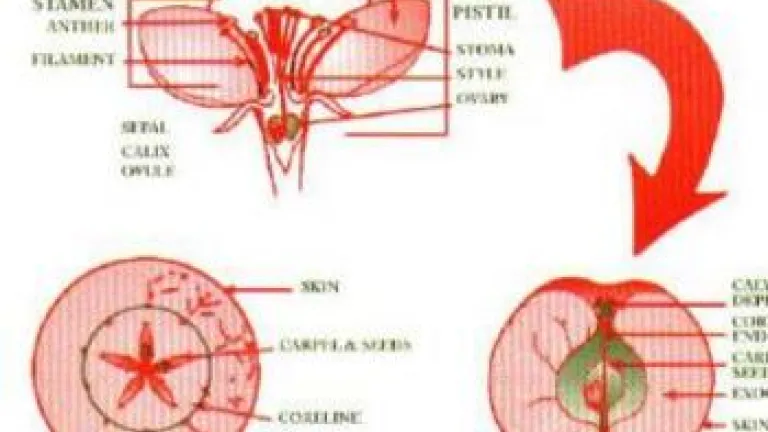How Rooted Are You?

Every year in March, for the last several years, a hundred miracles have occurred in my basement.
Those miracles are the sprouting and growth of tiny vegetable seeds into seedlings and then into plants ready to be set out into the garden. I consider that process to be miraculous because only God can make it happen. I cannot. All I do is to put the seed into the soil.
Here is how it works. First the root goes down into the potting soil; the stem goes up toward the grow lights and then the leaves develop. The first leaves look nothing like the mature leaves that grow later. This is the same process for nearly all plants. The roots go down into the soil and fix or anchor the plant to give it stability.
Second, the roots also absorb mineral salts and water from the soil and conduct them to the plant. Finally, the roots store these minerals and water, which are nutrients for the plant to use as needed. These three functions of roots are critical to the survival of the plant.
“Rooted and grounded”
In Ephesians 3:17, the apostle Paul prayed for the Christians in Ephesus to be “rooted and grounded” in the love of God. He prayed for what he knew the Ephesians needed, as do all Christians.
As we come to understand the important functions that the roots perform for the plants, we will see that these very few words are an absolutely wonderful part of his total prayer.
Paul used a horticultural metaphor in praying for Christians to be rooted. The Bible is full of metaphors which were well-understood in an agrarian society.
The New Living Translation puts it this way: “I pray that from his glorious, unlimited resources he will empower you with inner strength through his Spirit. Then Christ will make his home in your hearts as you trust in him. Your roots will grow down into God’s love and keep you strong. And may you have the power to understand, as all God’s people should, how wide, how long, how high, and how deep his love is. May you experience the love of Christ, though it is too great to understand fully. Then you will be made complete with all the fullness of life and power that comes from God” (Ephesians 3:16-19, emphasis added).
Another verse about Christians being rooted is in Colossians 2:7: “Let your roots grow down into him, and let your lives be built on him. Then your faith will grow strong in the truth you were taught, and you will overflow with thankfulness” (New Living Translation).
It is interesting to note that in Ephesians 3:17, the soil is God’s love. In Colossians 2:7, the soil is Christ Himself.
In Psalm 1, the righteous man is compared to a tree planted by the river. Throughout the Bible, Christians are sometimes compared to trees. Although we are never told what kind of plant Paul had in mind, the principles apply to all plants.
Three major functions of roots
Let’s now look more closely at the functions of roots to see why Paul used this metaphor. We will also look at the results of not being well-rooted.
1) Roots firmly fix the plant in the soil and provide stability.
The strongest root is called a tap root, which is the center root, the deepest root and the most important root. Secondary roots are called fibrous roots. They greatly increase the root volume and give the plant a wide root structure. Both the tap root and the fibrous roots give the plant stability, enabling it to stand upright.
Like plants, Christians need stability to withstand the winds and the storms (trials) of life. Our figurative roots are strengthened first by small trials or winds, and later are strengthened more by larger trials or storms.
Scientists working in Oracle, Arizona, proved that trees need wind to develop strong roots. They created sealed Biosphere glass domes where they could do scientific experiments. The domes contain a balanced mixture of plants and creatures to duplicate what would be found in several natural habitats, or “biomes.”
Unexpectedly, after some time passed, staff members noticed that trees fell down. The conclusion was that under the glass dome, with no wind, the trees had not developed strong root systems. So trees fell down and were uprooted!
We’ve all seen the remains of the root ball of a tree that has fallen over. The roots have been pulled out of the ground. At that point, the tree no longer has any support or stability because it was no longer firmly fixed in the soil, and it is no longer receiving any food.
Like plants, Christians need stability to withstand the winds and the storms of life.
As Christians, we can also fall and be uprooted during a storm of life if we are no longer receiving any spiritual food.
In our basement, where the little seedlings grow, I put an oscillating fan on a ledge near the plants. When the plants are about 3 inches tall, I turn the fan on the lowest speed to gently blow on the plants. As the plants get bigger and stronger, I increase the speed of the fan to simulate stronger winds. I also increase the time the fan is on, so that when the plants are moved outdoors into the real world they will be able to withstand the winds that will inevitably come.
Next think of the damage caused when a tree falls because of a lack of roots. We’ve all seen news reports where a tree fell down and knocked out the power lines that supply hundreds of homes. Or a tree fell down and destroyed a nearby home, or crushed a car parked in the driveway.
Imagine these possible headlines in a spiritual sense:
“A Christian who was not well-rooted fell down spiritually and caused damage to the faith of other Christians. They allowed him to get between them and God, thus knocking out their power.”
Our power source is Christ, not another Christian. This is one example of letting someone take your crown.
We must all be fixed in the soil and stable so these kinds of things never happen.
2) Roots bring nutrients and water to the plant, feeding the plant.
Roots do a lot more than give the plant stability. They bring food and water to the plant. Like plants, Christians need food and water, but they also need spiritual nourishment. We get this from God’s love and from Christ living in us. Notice Philippians 4:13: “I can do all things through Christ who strengthens me.” It is the indwelling of Christ and God’s Spirit that brings Christians moral and spiritual strength.
Most roots are below ground and are not seen. But some years I have used clear plastic cups where I could watch the roots grow. Nothing was visible at first. But soon, tiny roots appeared. Then eventually, the roots filled the cups. As each plant grew bigger, it needed more roots to support and to sustain it.
If Christians are to grow, we need more roots to support and to sustain us in our Christian growth. We need to go deeper in understanding, which takes more roots. We want to show more love, so we need deeper roots in God’s love to understand the depth of it. We need to be more deeply rooted in Christ.
Let’s go back to Ephesians 3 again and read verses 18 and 19: “And may you have the power to understand, as all God’s people should, how wide, how long, how high, and how deep his love is. May you experience the love of Christ, though it is too great to understand fully. Then you will be made complete with all the fullness of life and power that comes from God” (New Living Translation).
Yes, Christ is the epitome of God’s love. The Son came to earth to show us the Father and His Father’s love.
3) Roots store water and nutrients
When droughts come, plants have a certain amount of a reserve of water and nutrients that are stored in the roots. This sustains the plant for a while. When spiritual droughts come, our roots in Christ sustain us for some time.
The plants need the roots to be able to stand and to yield fruit in season. Christians need their roots to stand and to yield fruit in their season.
Our Christian roots are not seen, but the results of our roots are clearly visible.
Finally, if you are rooted, you will be fixed and stable, well-fed and sustained through storms. And you will grow spiritually.
When Paul prayed for the Ephesians to be rooted in God’s love, he was asking for a wonderful blessing upon them. When he prayed for the Colossians to be rooted in Christ, he was asking for a wonderful blessing upon them, also.
We strengthen our roots by using the spiritual tools: prayer, study, meditation, fasting, exercising God’s Spirit.
Like the plants we see everywhere, Christians have to be rooted to grow. Plants and Christians need their roots until the day they die.
May all of us be more rooted in God’s love and rooted in Christ, so that we remain firmly fixed, stable, well-fed and filled with a reserve of spiritual strength for times of stress and storms.






